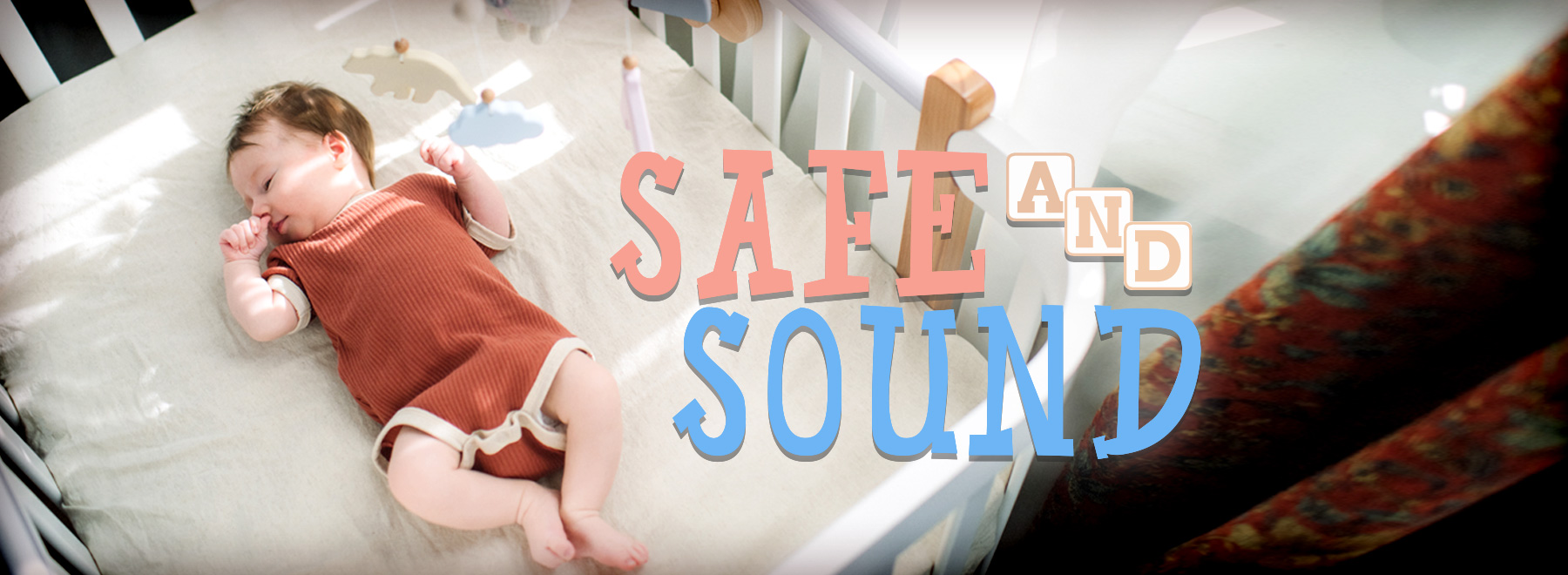Research, legislation aimed at making sleep safer for babies
Take crib bumpers and inclined sleepers off your baby registry list.
Once considered nursery must-haves, crib bumpers and inclined sleepers are the focus of the Safe Sleep for Babies Act that was signed into law in May. The items will be banned under the Consumer Product Safety Act when the law goes into effect later this year because of the danger they pose to babies. Research shows that these items can increase the risks for babies prone to SIDS.
Each year in the United States, thousands of babies die suddenly and unexpectedly. These deaths are called SUID, or Sudden Unexpected Infant Death. SIDS, or Sudden Infant Death Syndrome, is the unexplained death of a seemingly healthy baby less than a year old. Often SIDS deaths happen during sleep.
SUID includes all unexplained infant deaths – those without a clear cause such as SIDS and those with a known cause such as suffocation. About half of SUID cases are SIDS.
Each year, more than 3,500 sleep-related infant deaths happen, according to the U.S. Centers for Disease Control and Prevention.
According to the Mississippi State Department of Health’s Infant and Mortality Report for 2020, SUIDS was the second leading cause of death for babies in the state, claiming 72 babies’ lives in 2019 and 78 in 2020.
Crib bumpers, once a must-have for baby bedding, were designed to cushion babies from crib slats. They’ve been proven to be dangerous, increasing babies’ risks of strangulation and suffocation. They also create a fall risk, since older babies can stand on top of crib bumpers to climb out of the crib. According to AAP statistics, crib bumpers have been linked to more than 100 babies’ deaths in the past 30 years.
The Consumer Product Safety Commission warns that infant sleep products that incline more than 10 degrees are unsafe. Inclined sleepers or loungers place babies at a 30-degree angle. When babies fall asleep at this angle, their heads can nod to a chin-to-chest position that can restrict breathing. Inclined sleepers have contributed to at least 94 deaths, according to the AAP.

Knowing these products will be banned as dangerous later this year will keep families from buying them for babies now, said Dr. Mobolaji Famuyide, professor and chief of newborn medicine at the University of Mississippi Medical Center.
“The Medical Center has worked to educate parents on safe sleeping practices through its Safe Sleep Initiative,” she said, noting that UMMC in working with the Mississippi Perinatal Quality Collaborative (MSPQC) to develop a crib distribution program.
Current efforts have resulted in UMMC gaining a silver designation as a Certified Safe Sleep Leader by Cribs for Kids, a national organization focused on reducing sleep-related deaths in infants. This collaboration with MSPQC will move the institution toward a gold designation.
The CDC recommends that babies sleep on their backs for naps and at night. A firm, flat surface such as a sheet-covered crib mattress is safest for sleep, yet the CDC reports that 39 percent of mothers still put babies to bed in soft bedding that’s not recommended.
“We have more work to do in letting parents know the safest way for babies to sleep,” said Slay Jeffords, neonatal intensive care nurse manager at the NICU inside the Kathy and Joe Sanderson Tower at Children’s of Mississippi.
Grandparents who likely put babies to bed in soft bedding surrounded by crib bumpers are an important audience.
Thinking has changed over the decades as safer sleep practices are discovered, she said.
“We teach families the ABCs of safe sleep. Babies should sleep alone on a firm surface without pillows or bumpers, sleep on their backs, in a crib and in a smoke-free environment.”
Most scientists believe that babies who die of SIDS are born with one or more conditions that cause unexpected responses to the internal and external stressors common during an infant’s life. For example, research shows that some babies may have abnormalities in the brainstem that controls breathing, heart rate, blood pressure, temperature, and waking from sleep. Scientists think these abnormalities alone may not lead to SIDS, but when combined with the increased risks posed by stomach sleeping, sleeping at an incline, or sleeping in a crib with soft bedding or bumpers, the result could be deadly.
“The message from pediatricians has long been clear: the safest sleep environment for babies is a firm, flat, bare surface,” said Dr. Moira Szilagyi, president of the American Academy of Pediatrics. “Despite what the science shows, crib bumpers and inclined sleepers have remained on the market and store shelves, misleading parents into thinking they are safe and leading to dozens of preventable infant deaths. No family should ever experience this tragedy.”
The above article appears in CONSULT, UMMC’s monthly e-newsletter sharing news about cutting-edge clinical and health science education advances and innovative biomedical research at the Medical Center and giving you tips and suggestions on how you and the people you love can live a healthier life. Click here and enter your email address to receive CONSULT free of charge. You may cancel at any time.



